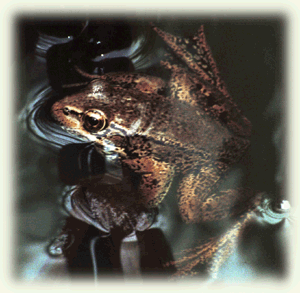|
 News News
 Subscribe to Our Newsletter Subscribe to Our Newsletter
 Sign up for Email Updates
Sign up for Email Updates
 CGF In the News
CGF In the News
 Press Inquiries Press Inquiries
 Past Articles Past Articles
 Calendar Calendar
|
|
|
Frog habitat destroyed on Phillips Brooks School property
by Lennie Roberts
The
celebrated jumping frog of Mark Twain's day isn't jumping with joy these days in Woodside. The 92-acre site owned by Phillips Brooks School is home to the federally protected California red-legged frog, which inhabits two small ponds on the property, along with the southwestern pond turtle and many other
aquatic critters.

The frogs used to be found in vast areas of the state, but today
their population has dwindled to such a degree that they are listed as a Federally Threatened Species. Any project that may affect their habitat is required to adopt strict measures to protect the frogs from
any possibility of "taking" (killing).
The Environmental Impact Report (EIR) for the now-defunct Phillips Brooks School project, acknowledging that frogs are on
the property, required that a 100-foot buffer zone be established around any wetland site on the property, where no disturbance would be allowed to occur. The EIR also recommended
measures for fire protection such as mowing a fire break in the grasslands, but required that no mowing should invade the 100-foot buffer zone around the ponds and wetlands.
The ink was hardly dry on the EIR last June when the school, apparently at the specific request of the Woodside Fire Department, mowed a 100-foot wide swath through the
grasslands along the edges of the property. In direct contravention of the EIR mitigation measures for the frog, the school invaded the buffer zone and mowed right up next to the edge of the wetlands
around the ponds.
It is unknown whether any frogs were killed by this irresponsible mowing. There wasn't any investigation of the mowing until Committee for Green Foothills filed a complaint with the fish and
wildlife agencies in July, and by then it was too late to look for dead frogs. However, under the Endangered Species Act, destroying habitat is also a violation of the law. Frogs use areas
beyond ponds for foraging, and have been documented to range up to a mile from streams and wetlands, so this mowing has certainly altered conditions of the natural habitat on which they depend.
This incident points out an all too frequent pattern with EIRs and mitigation measures. Great attention is paid to instituting protections, and the applicant(s) profess that they are committed
to being good stewards of the land, but over time critical mitigation measures are forgotten or ignored. With an institution, it is particularly difficult to ensure that mitigation measures become
an enduring part of their operation, as institutional memories can be lost as people come and go.
Since the summertime devastation of the frog habitat, the Woodside Planning Commission voted 4-3 to deny the controversial proposed development of this rural property
, planned for several years by Phillips Brooks School.
Meanwhile, the frogs didn't have a voice in this debate. We hope that Woodside's leaders will speak up for the frogs - and for open
space - as they deliberate on future uses of this property.
Published October 2002 in
Green Footnotes.
Page last updated November 4, 2002. |
|
![]()
![]()




